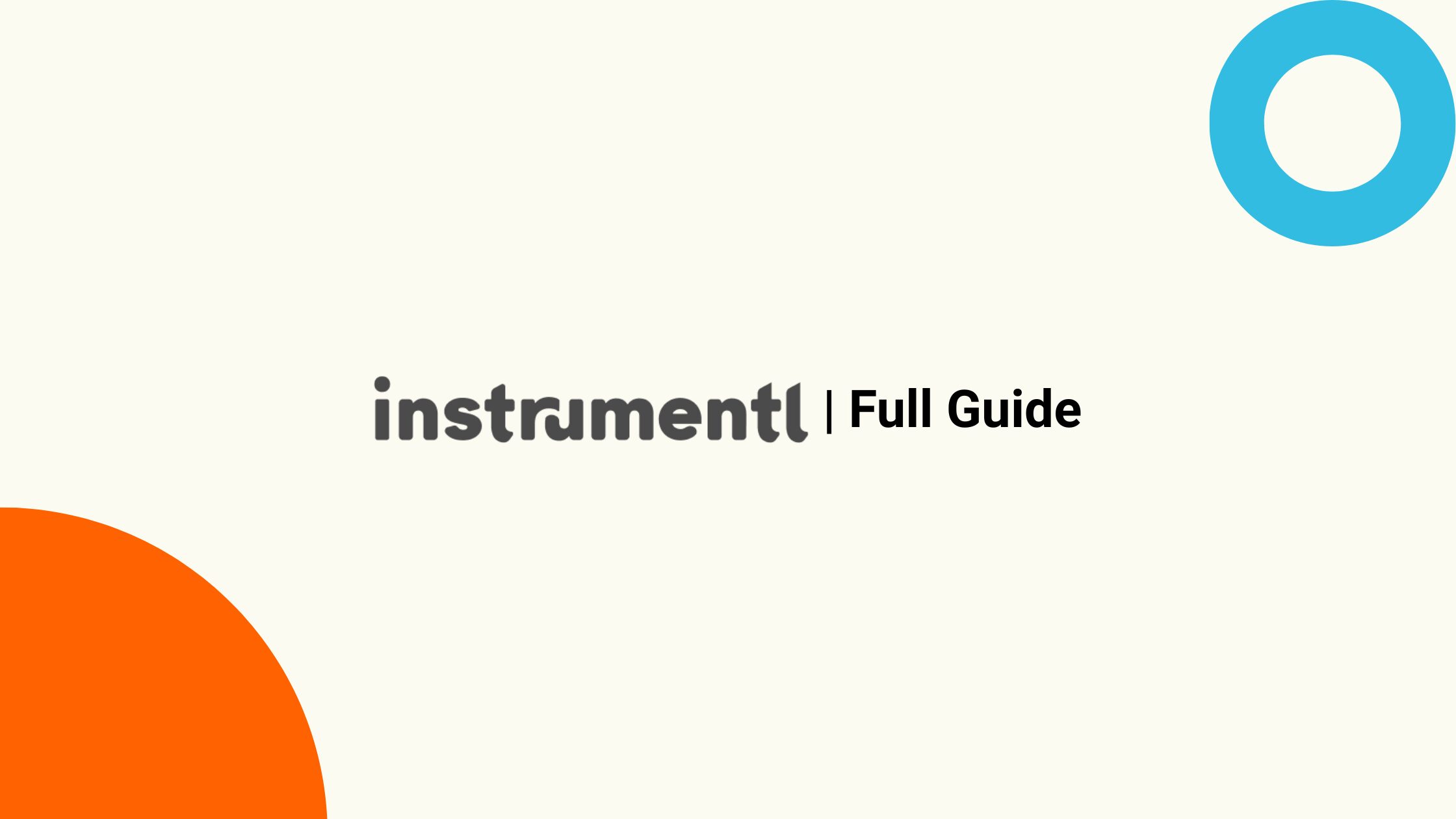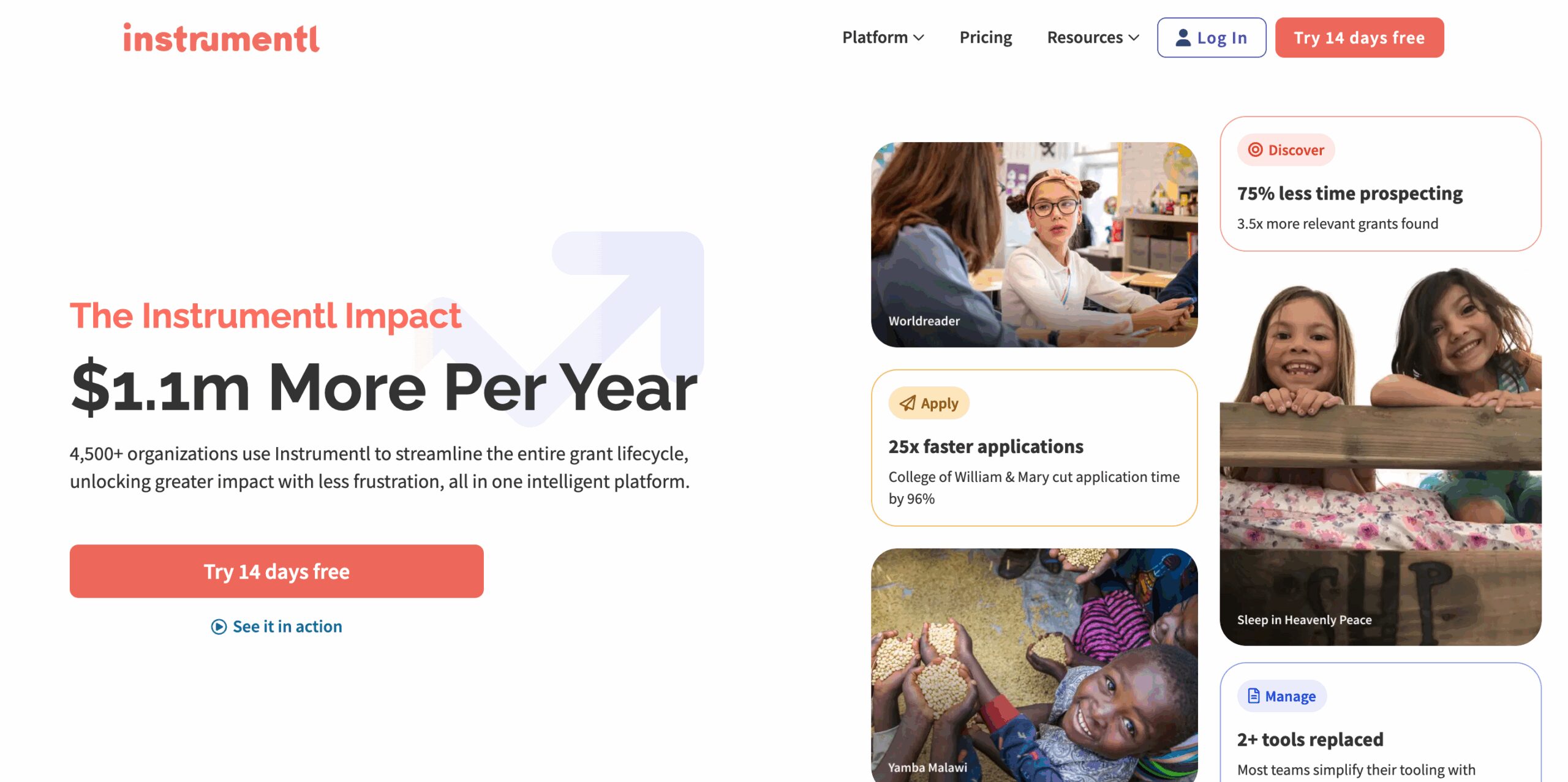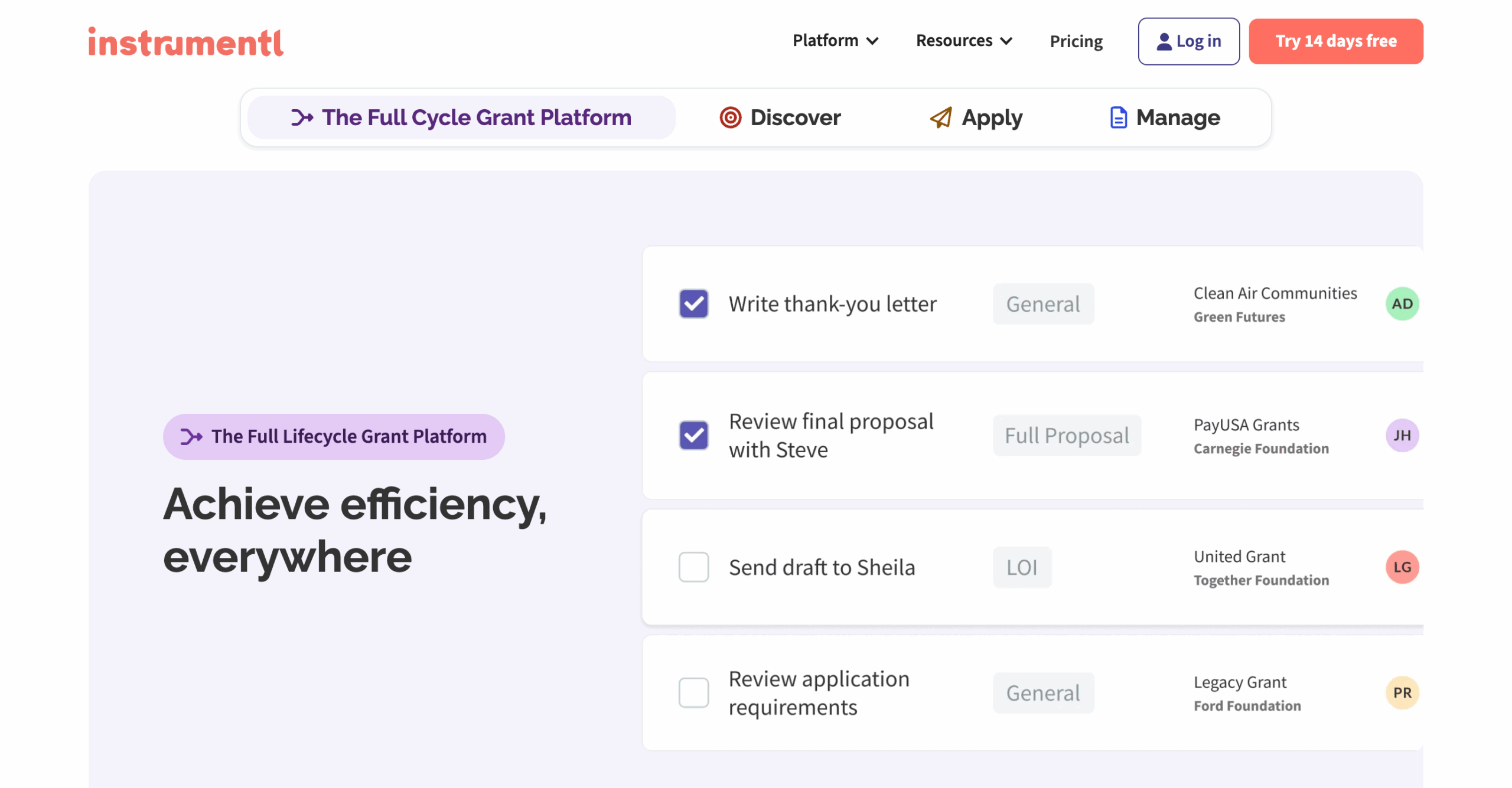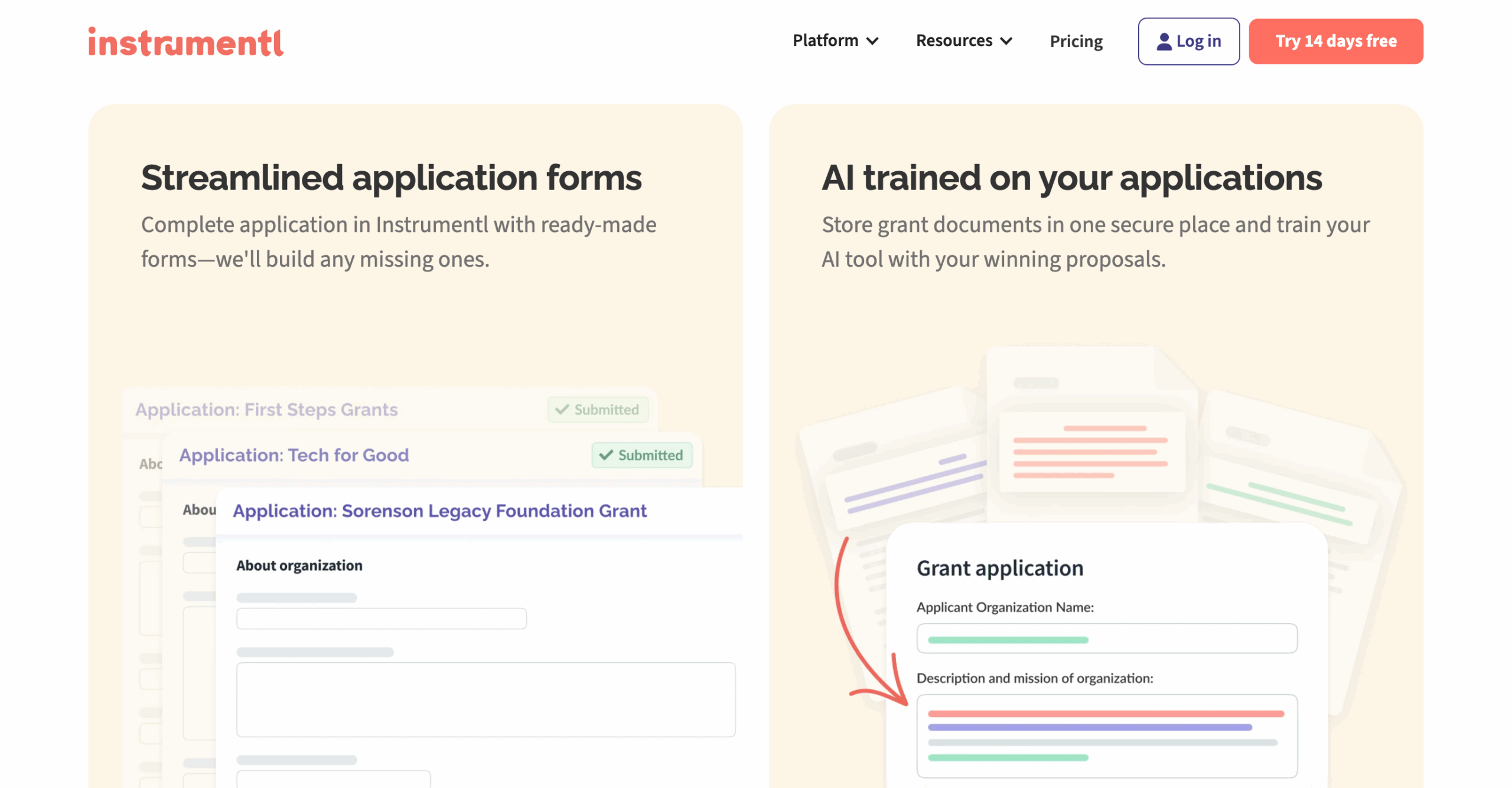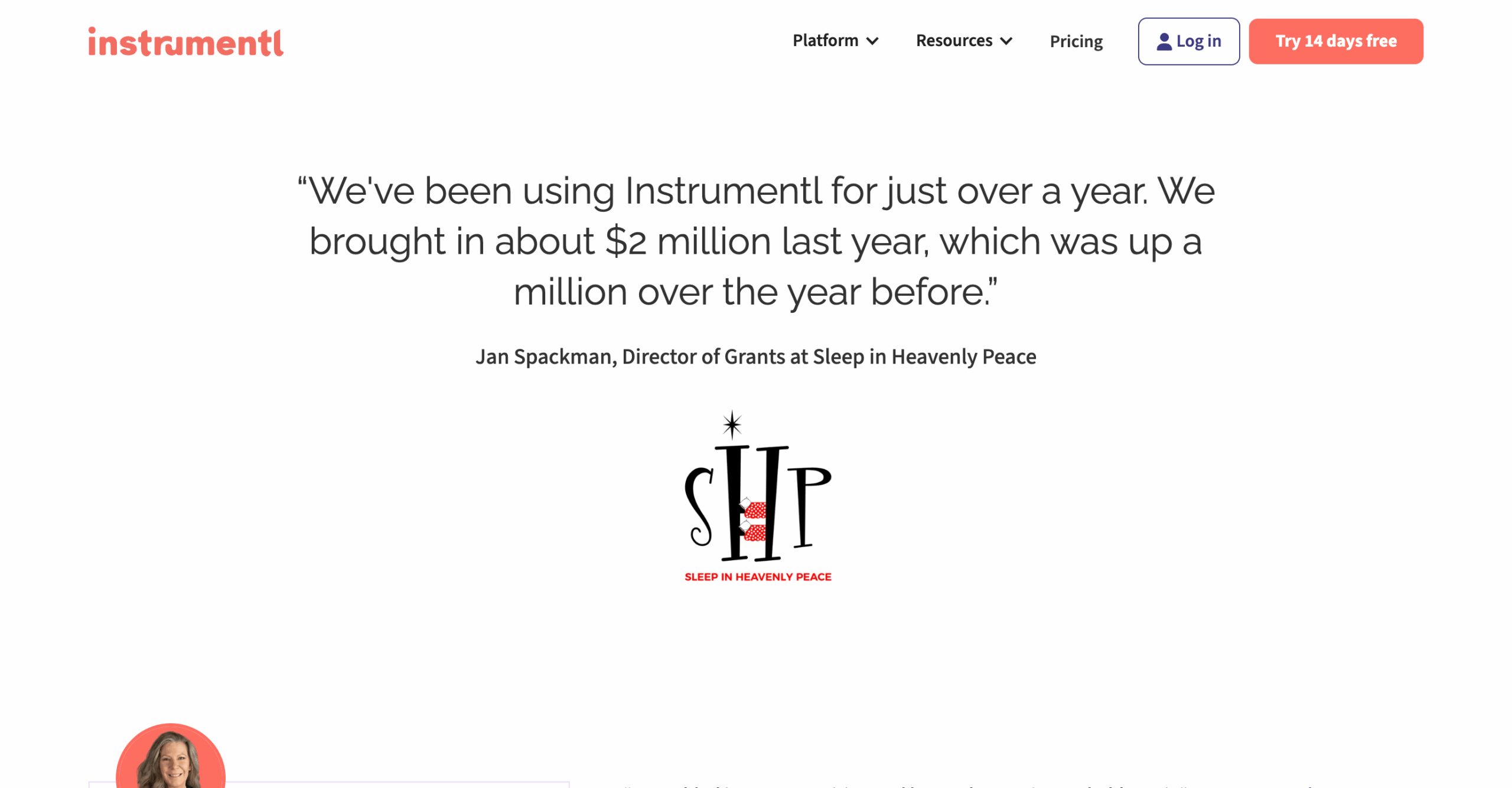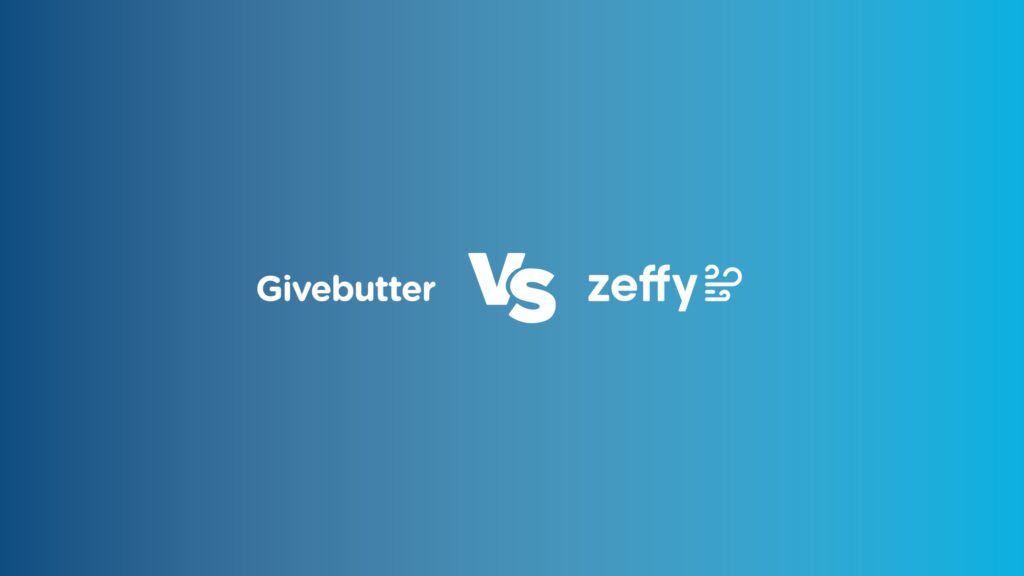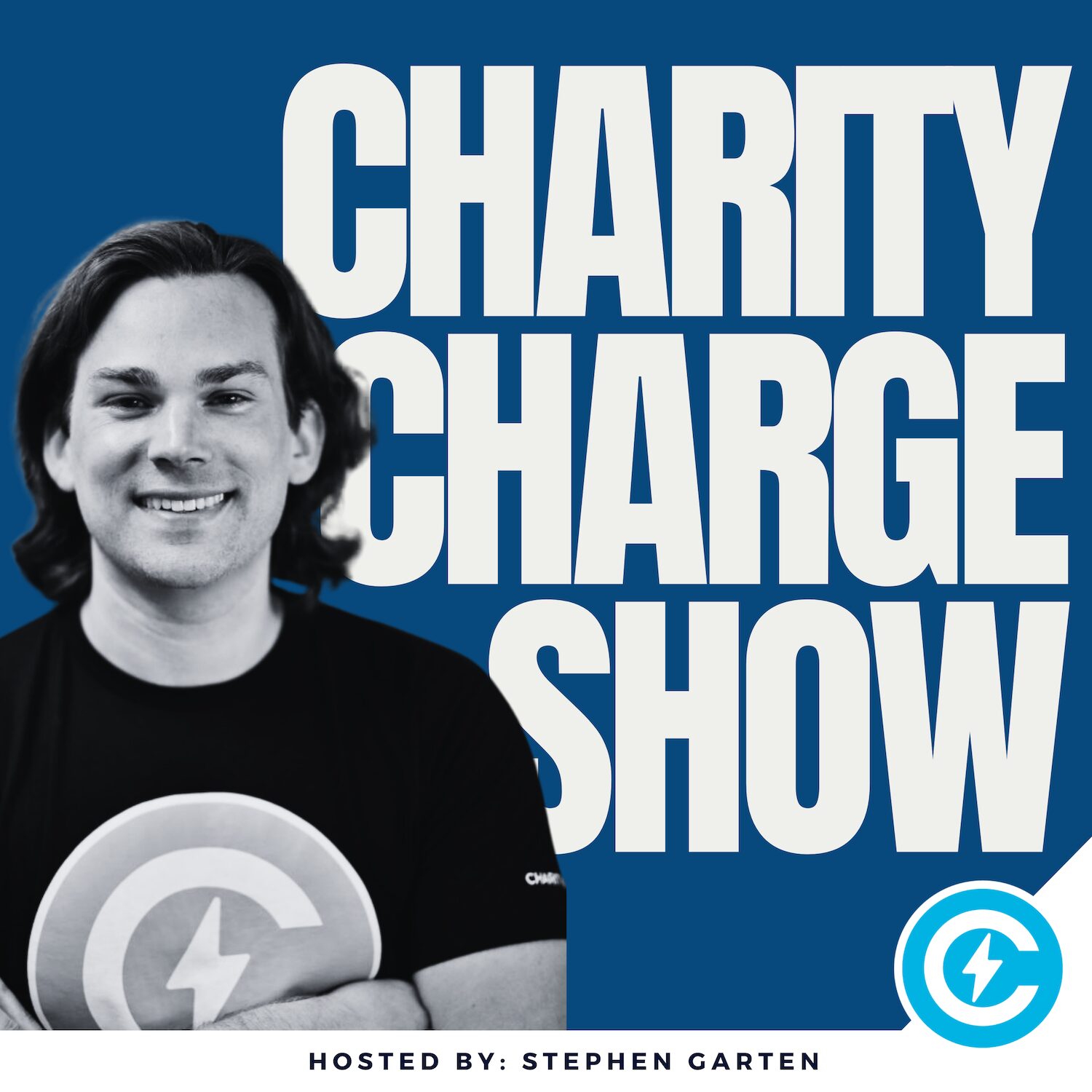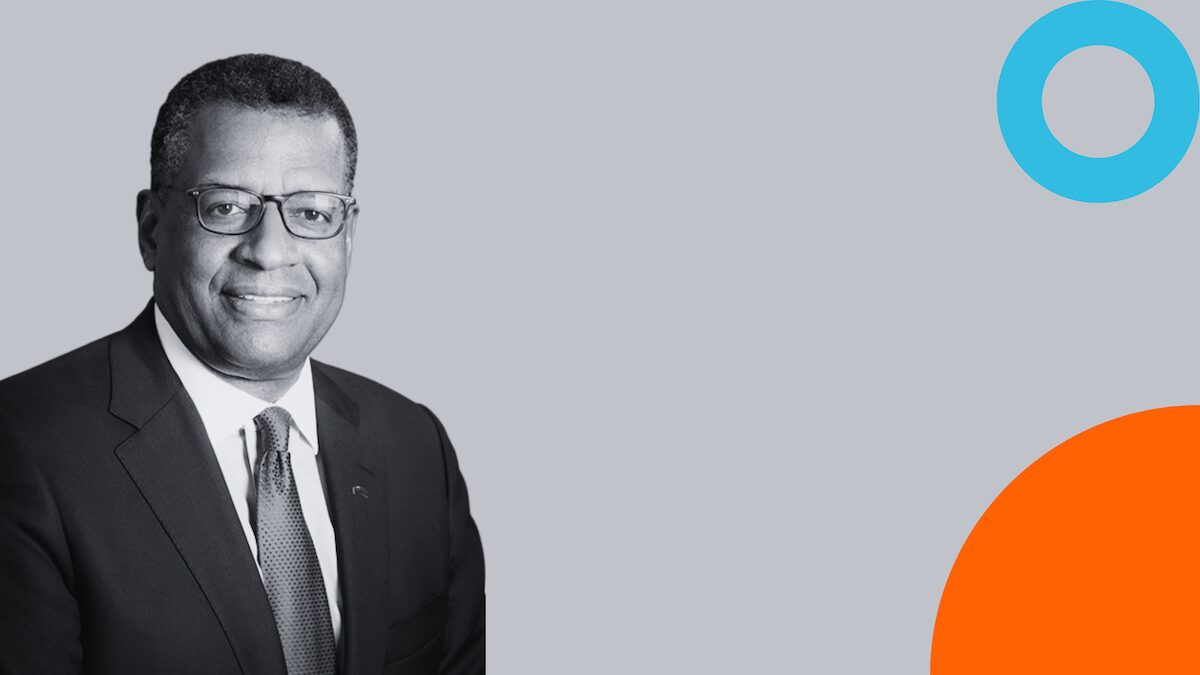Instrumentl empowers nonprofits, grant consultants, and development teams to discover, apply for, manage, and report on grants—all within a single intelligent platform. By marrying AI-driven prospecting with collaborative grant management, Instrumentl reduces manual work, surfaces best-fit opportunities, and accelerates proposal creation.
In this comprehensive guide, we’ll dive deep into every aspect of Instrumentl:
-
What Instrumentl Is and Why You Need It
-
Core Platform Features (Discover, Apply, Manage, Report)
-
Pricing Plans & What Each Includes
-
Step-by-Step Onboarding: Getting Started with Instrumentl
-
Best Practices for Maximizing Your Grant Success
-
Real-World Impact & Customer Stories
-
Frequently Asked Questions
-
Next Steps & Resources
What Is Instrumentl? A High-Level Overview
Instrumentl is a full-lifecycle grant management platform designed to streamline every step—Discover, Apply, Manage, and Report—under a single intelligent interface. Since 2015, more than 4,500 nonprofits, educational institutions, and grant consultancies have relied on Instrumentl to:
-
Cut application times by up to 96% (College of William & Mary)
-
Reduce prospecting time by 75% (Yamba Malawi)
-
Replace 2+ disparate tools with one unified system (Sleep in Heavenly Peace)
-
Unlock over $1.1M additional annual revenue across participating organizations
At its core, Instrumentl uses AI-driven matching to connect your organization with the most relevant grant opportunities—then guides you through crafting proposals, tracking deadlines, collaborating with stakeholders, and maintaining post-award compliance.
No more siloed spreadsheets, no more missed deadlines, and no more scattered data. Instrumentl brings everything into one secure, cloud-based platform.
Use code CHARITY50 for $50 off any plan (new Instrumentl users only) – Get Started
Why Choose an All-In-One Grant Management Platform?
Grantseeking is inherently complex:
-
Dozens of grant databases
-
Hundreds of RFP criteria to parse
-
Multiple stakeholders (development officers, program staff, finance teams)
-
Tight deadlines and evolving requirements
-
Post-award compliance tasks (reporting, spend-down tracking)
Many organizations piece together this workflow using a mix of Google Sheets, Airtable, shared drives, email threads, and one-off grant databases. That fragmentation leads to:
-
Lost opportunities when deadlines slip through the cracks.
-
Wasted time manually sifting through thousands of RFP documents.
-
Inconsistent collaboration across teams and external partners.
-
Difficulty demonstrating impact to leadership without centralized metrics.
Instrumentl solves these pain points by offering a single platform where you can:
-
Discover best-fit grants in seconds instead of weeks—leveraging over 20,000 curated opportunities and 400,000+ funder profiles.
-
Apply using built-in AI proposal drafting tools (Apply Advisor), an integrated document library, and private RFP forms—so you spend less time reinventing the wheel and more time tailoring content.
-
Manage post-award tasks—automatically extracting compliance requirements, tracking spend-down, and assigning tasks with calendar integration.
-
Report on insights—internal dashboards show you which grants your peers received, how your pipeline is trending, and the overall ROI of your grant efforts.
By consolidating discovery, application, management, and reporting, Instrumentl acts as your “grant HQ”—ensuring no detail is overlooked and every opportunity is acted on quickly.
Instrumentl’s Core Features: The Full Lifecycle Grant Platform
Below is a detailed breakdown of each module within Instrumentl—from discovering new funding to managing post-award deliverables.
Discover: Find Best-Fit Grants in Seconds, Not Weeks
Key Capabilities
-
Intelligent Matching Engine
-
Upload your organization’s IRS Form 990 (or your sector, program area, and geography) to instantly surface a prioritized list of best-fit grants.
-
Instrumentl’s AI analyzes your mission, budget size, and funding history to rank opportunities that align with your profile.
-
-
20,000+ Curated Grant Opportunities
-
Access a database of active RFPs, open letter appeals, and foundation calls for proposals—updated weekly by Instrumentl’s in-house research team.
-
View detailed grant overviews, deadlines, and funder requirements without leaving the platform.
-
-
400,000+ Funder Profiles & Peer Prospecting
-
Explore funder insights (e.g., typical grant sizes, giving history, application requirements).
-
Use Peer Prospecting to see which foundations have funded organizations like yours—then add them to your watchlist.
-
-
Smart Filters & Saved Searches
-
Narrow down opportunities by program area, region, granting amount, deadline window, or newly posted RFPs.
-
Save custom search criteria and receive automated email alerts when new matches appear.
-
Why It Matters: Traditional grant searches often require toggling between multiple databases, manually filtering by criteria, and cross-referencing funder websites. Instrumentl’s unified pipeline cuts your prospecting time by up to 75%, enabling you to focus on strategic grants rather than data entry.
Apply: Craft High-Quality Proposal Drafts in Minutes
Key Capabilities
-
Apply Advisor (AI-Assisted Drafting)
-
Instrumentl’s proprietary AI is trained on tens of thousands of winning proposals, IRS Form 990 data, and funder preferences.
-
As you draft narrative sections (e.g., “Problem Statement,” “Program Description”), Apply Advisor surfaces relevant language from your previous applications, internal templates, and examples that align with the funder’s priorities.
-
Preserve your unique voice—AI suggestions are optional, and you can customize any text snippet on the fly.
-
-
In-App RFP Forms & Private Grant Portal
-
Many private foundations require completing their unique PDF or web forms. Instrumentl allows you to upload those forms directly, annotate them, and store them alongside your project workspace.
-
Team members can collaborate on form sections simultaneously—no more juggling emailed Word docs.
-
-
Centralized Document Library
-
Store organizational documents (e.g., IRS determination letter, strategic plan, financial statements, logic models) in one secure repository.
-
Link documents to specific grant applications so they’re always at hand when a funder requests supporting materials.
-
-
Versioned Drafts & Change Tracking
-
Keep track of every revision with version history. If you need to roll back to an earlier draft or review past edits, Instrumentl’s version control has you covered.
-
Why It Matters: The average grant writer spends 8–10 hours on each high-quality proposal. By reusing proven language, surfacing data points from past applications, and collaborating in a centralized workspace, Instrumentl can cut that time in half—enabling you to submit more applications with fewer resources.
Manage: Simplify Post-Award Compliance & Tracking
Key Capabilities
-
Award Review Assistant (AI-Powered Extraction)
-
Upload grant award letters, MOUs, or contracts directly into Instrumentl. The AI scans for key details—funding amounts, payment schedules, reporting deadlines, and compliance requirements.
-
Automatically populates a structured “Grant Summary” with extracted data so you don’t miss critical clauses.
-
-
Spend-Down & Budget Forecasting
-
Track how much of each grant has been expended vs. remaining.
-
Set automated reminders for upcoming reporting deadlines, fiscal benchmarks, or audit dates.
-
Visualize spend-down curves to identify potential shortfalls before they occur.
-
-
Task Assignment & Shared Calendars
-
Create tasks (e.g., “Prepare Q2 financial report,” “Submit progress narrative”) and assign them to team members with due dates.
-
Integrate Instrumentl’s calendar with Google Calendar or Outlook, ensuring everyone sees reminders in their preferred workflow.
-
-
Collaborative Document Sharing & Permissions
-
Invite external partners (e.g., sub-recipients, consultants) to view or edit specific documents without granting full platform access.
-
Manage user roles (Admin, Editor, Viewer) to control who can upload budgets, edit proposals, or finalize compliance reports.
-
Why It Matters: Post-award management is often as time-consuming as writing applications. By extracting compliance tasks, automating reminders, and centralizing all award-related data, Instrumentl helps you maintain strong funder relationships—minimizing the risk of missed deliverables or audit findings.
Report: Track Impact & Internal Metrics
Key Capabilities
-
Customizable Dashboards
-
View at-a-glance metrics: number of active proposals, total pending ask amounts, win rates, funds awarded, and pipeline status by fiscal quarter.
-
Filter by program area, grant type (foundation, federal, corporate), or region to understand which segments drive the highest ROI.
-
-
Peer Benchmarking & Impact Study
-
Instrumentl’s Impact Study aggregates anonymized data across thousands of users. Compare your organization’s application velocity, win rate, and funding growth against peers of similar size or mission focus.
-
See how much additional funding organizations like yours have unlocked—e.g., median increase of $1.1M per year.
-
-
Exportable Reports & Board-Ready Summaries
-
Generate PDF or CSV exports of key metrics for leadership presentations.
-
Schedule recurring reports (quarterly or annual) to automatically send to board members or finance teams.
-
Why It Matters: Data-driven decision-making is critical for continuous improvement. Instrumentl’s integrated reporting ensures you know which grant categories yield the best outcomes—so you can double down on winning strategies and pivot away from low-ROI efforts.
Integrations & Customization: Tailor Instrumentl to Your Workflow
Instrumentl seamlessly integrates with tools you already use, reducing context switching and keeping all team members aligned:
-
Cloud Storage Integrations (Google Drive, Dropbox, OneDrive)
-
Sync your existing document libraries for backup and file versioning.
-
-
Calendar Sync (Google Calendar, Outlook)
-
Automatically push Instrumentl tasks and deadlines directly into personal or shared calendars.
-
-
CRM & Donor Software (Salesforce, Raisely, Bloomerang) via API or CSV exports
-
Import awarded grant revenue into your CRM’s donation records.
-
Map grant funders to donor profiles for holistic donor cultivation.
-
-
Slack Notifications
-
Receive instant Slack alerts when new grants match your criteria or when deadlines approach.
-
-
Custom Fields & Tags
-
Create organization-specific tags (e.g., program area, funding priority, risk level) and filter opportunities or awards using these labels.
-
Use custom fields in your “Organization Profile” to inform matching—such as average budget size, geographic focus, or priority keywords.
-
Why It Matters: No two organizations operate identically. With flexible integrations and custom fields, Instrumentl adapts to your unique processes—eliminating manual data entry and reinforcing consistency across platforms.
Detailed Pricing Breakdown: Plans, Features, and Add-Ons
Instrumentl offers a clear, tiered pricing structure tailored to organizations of varying sizes and needs. All plans come with a 14-day free trial, allowing you to test every feature risk-free. Below is a breakdown of each plan’s cost and included features.
14-Day Free Trial: Try Every Feature Risk-Free
-
Classic 14-Day Access: New users receive full access to Discover, Apply, Manage, and Report modules (no credit card required).
-
Dedicated Onboarding Resources: Access to live webinars, step-by-step tutorials, and priority support to ensure you see value within the trial period.
Pro Tip: During your trial, import your Form 990 (or organization data) to see personalized grant matches immediately. That way, you can gauge instrumentl’s potential to accelerate your grant pipeline.
Tiered Plans Overview
| Plan | Annual Cost | Who It’s For | Included Features |
|---|---|---|---|
| Basic | $179 / mo | Small nonprofits or teams of 1–2 grantwriters | – Intelligent matching (Discover) – Access to 20,000+ curated grants – Basic Peer Prospecting – Document library with 5GB storage – Apply Advisor (AI writing) limited to 5 proposals/month – Email & chat support |
| Standard | $299 / mo | Mid-sized nonprofits or teams of 3–5 grant professionals | Everything in Basic, plus: – Unlimited Apply Advisor drafts – Award Review Assistant (AI extraction) – Spend-down tracking & forecasting – Team collaboration (up to 10 users) – Custom tags & fields |
| Pro | $499 / mo | Established organizations, grant consultancies | Everything in Standard, plus: – Priority support (SLAs under 24 hours) – Advanced Peer Prospecting & funder research tools – Custom dashboard & metrics – Unlimited user seats – Dedicated account manager |
| Advanced | $899 / mo | Large nonprofits, universities, or multi-branch organizations | Everything in Pro, plus: – Custom Integrations (API/CRM) – White-labelling for internal portals – Premium onboarding & training sessions – Enhanced security (SSO, SCIM provisioning) – 24/7 VIP support |
Notes on Storage & Users:
-
Basic includes 5 GB of document storage; additional storage may be purchased.
-
Standard plan allows up to 10 user seats; Pro and Enterprise have unlimited seats.
-
All paid plans include full platform access (Discover, Apply, Manage, Report) and remove usage caps on AI tools.
Custom Add-Ons & Enterprise Options
While all core modules are available in each paid plan, Enterprise customers can request:
-
SSO & SCIM Provisioning for seamless user management.
-
Custom API Access to push or pull data into institutional CRMs, ERP systems, or custom grant portals.
-
White-Labelling to embed Instrumentl features within an institution’s intranet or fundraising portal.
-
Dedicated Implementation Specialist for onboarding, data migration, and process redesign.
If you require specialized workflows—such as integration with a proprietary funder database or complex reporting pipelines—Instrumentl’s team will work with you to build a tailored solution under a custom quote.
Step-by-Step Onboarding: How to Get Started with Instrumentl
A successful Instrumentl rollout requires clear initial steps. Follow this onboarding blueprint to ensure a smooth transition:
1. Set Up Your Account & Team Permissions
-
Sign Up & Verify Email:
-
Visit Instrumentl.com and click Try 14 Days Free. Enter your work email and create a secure password.
-
Confirm your email address via the verification link.
-
-
Complete Your Organization Profile:
-
Upload your organization’s IRS Form 990 (PDF). If you don’t have a 990, you can manually enter:
-
Mission statement
-
Annual budget size
-
Program areas (education, environment, health, etc.)
-
Geographic focus (state, region, or international)
-
-
-
Invite Team Members:
-
Under Settings > Team & Permissions, invite colleagues, consultants, or board members.
-
Assign roles:
-
Admin (full platform access)
-
Editor (can modify proposals, tasks, and documents)
-
Viewer (read-only access to dashboards and reports)
-
-
-
Configure User Permissions & Security:
-
Enable Two-Factor Authentication (2FA) under Settings > Security.
-
(Enterprise Only) Set up Single Sign-On (SSO) via SAML for centralized user management.
-
2. Define Your Grant Priorities & Custom Fields
-
Identify Key Program Areas:
-
Under Discover > Filters, select broad categories that match your mission (e.g., “Early Childhood Education,” “Wildlife Conservation,” “Immigrant Services”). This helps AI learning.
-
-
Set Up Custom Tags & Fields:
-
Go to Settings > Custom Fields. Create tags like “Capital Campaign,” “Technology Upgrade,” or “Operating Support.”
-
Tag each opportunity or awarded grant with relevant labels—making it easier to filter dashboards or reports later.
-
-
Establish Internal Funding Criteria:
-
Decide on minimum and maximum grant sizes you’ll target (e.g., $5,000–$100,000).
-
Determine preferred grant timelines (e.g., 6-month lead time, fiscal-year alignment).
-
By codifying these priorities up front, Instrumentl’s AI matching becomes laser-focused—surface only those opportunities that truly fit your requirements.
3. Discover & Save Best-Fit Opportunities
-
Run Your First Discovery Search:
-
Navigate to Discover > All Opportunities. Instrumentl will automatically display grants ranked by match score.
-
Sort by “Highest Match” to see opportunities that align most closely with your organization profile.
-
-
Refine with Filters:
-
Use filters for:
-
Deadline Window: Next 30, 60, or 90 days
-
Grant Size: $5k–$25k, $25k–$100k, $100k+
-
Funder Type: Foundation, Corporate, Government, Individual
-
Program Area: Education, Social Services, Environment, etc.
-
-
-
Review Funder Profiles & Peer Insights:
-
Click any funder to view:
-
Recent giving history
-
Geographic preferences
-
Peer organizations they support (via Peer Prospecting)
-
-
-
Save & Classify Opportunities:
-
Click “Save Opportunity” to add it to your “Prospect List.”
-
Tag each saved opportunity with your custom fields (e.g., “Priority: High,” “FY25 Pipeline”).
-
-
Enable Automated Alerts:
-
Turn on “Grant Alert Emails” so you receive a digest of new matches weekly or daily—ensuring you never miss late-breaking RFPs.
-
Pro Tip: Review your saved opportunities once per week. Archive any that no longer fit due to changes in scope or budget, and reprioritize new matches accordingly.
4. Create Intelligent Grant Alerts & Peer Prospecting
-
Set Up Grant Alerts:
-
Under Discover > Alerts, define criteria for recurring alerts. For instance:
-
“Grants $25k–$75k”
-
“RFPs due within 45 days”
-
“Funding focused on rural education in the Midwest”
-
-
-
Leverage Peer Prospecting:
-
In each funder’s profile, click “View Peer Organizations.” Instrumentl will show you a list of nonprofits similar in mission or size that have received grants from that funder.
-
Save peer insights to your dashboard to identify emerging funders you might not have considered.
-
-
Export Peer Data (Optional):
-
If you want to conduct targeted outreach to peer organizations for partnership or co-funding, export peer lists as a CSV to your CRM.
-
Why Peer Prospecting Matters: Philanthropic trends often propagate through peer networks. If three organizations similar to yours secured funding from a new foundation, that funder is likely open to supporting your mission as well.
5. Use Apply Advisor & Document Library to Draft Proposals
-
Start a New Grant Application Workspace:
-
Under Apply > New Application, select a saved opportunity from your Prospect List.
-
Instrumentl auto-populates the grant title, deadline, award amount, and funder details.
-
-
Leverage Apply Advisor (AI Writing Assistant):
-
As you begin each narrative section (e.g., “Needs Statement,” “Project Goals,” “Evaluation Plan”), click “Get AI Suggestions.”
-
Instrumentl analyzes your past winning proposals, your organization’s publicly available data, and the funder’s stated priorities to surface template language.
-
Edit, refine, and personalize the AI-generated text to ensure it reflects your unique voice and program strategy.
-
-
Attach Supporting Documents:
-
In the Documents tab, upload:
-
IRS determination letter
-
Board of Directors list
-
IRS Form 990
-
Logic model or theory of change
-
Any required attachments (e.g., audited financial statements)
-
-
For private foundation RFPs that require filling in their specific template PDF or online form, upload the PDF under “Funder-Provided Documents.” Team members can annotate and collaborate on those documents within Instrumentl.
-
-
Collaborate with Your Team:
-
Tag colleagues in comments on specific sections (e.g., “@JaneDoe, please review the budget justification”).
-
Use “@mentions” to assign action items—Instrumentl will automatically generate a task with a deadline and notify that user via email or Slack (if integrated).
-
-
Finalize & Download:
-
When your draft is complete, click “Export to PDF” or “Download Application Package.” Instrumentl compiles all sections, attachments, and required forms into a neatly packaged file—ready for submission.
-
Pro Tip: Save common boilerplate sections (mission statements, organizational history) as “Reusable Snippets” in your Document Library. That way, you can drag and drop them into any new application, ensuring consistency and saving hours of retyping.
6. Track Deadlines, Tasks, & Collaborate with Your Team
-
View Your Grant Calendar:
-
Under Manage > Calendar, see all upcoming deadlines (LOI, full proposal, budget submission, site visits) across every saved opportunity.
-
Filter by user, program area, or funding source to declutter the view and focus on high-priority tasks.
-
-
Create & Assign Tasks:
-
Within each application workspace, click “Add Task.” Examples:
-
“Draft narrative by April 15”
-
“Complete budget spreadsheet by April 20”
-
“Upload 2023 audited financials by April 22”
-
-
Assign tasks to specific team members with due dates. Assignees receive automatic email or Slack notifications.
-
-
Set Automated Reminders:
-
For critical milestones (e.g., final proposal due, budget deadline, site visit request), configure “Reminder Alerts”—choose to receive alerts 7 days, 3 days, and 1 day before due dates.
-
Reminders can be sent to an entire user group (e.g., “All Grant Writers”) or a single individual.
-
-
Collaborate Externally (if Needed):
-
If you work with sub-recipients or external consultants, invite them as “Guest Collaborators”. They gain access only to specific documents or tasks without seeing the entire account.
-
Set an expiration for guest access to automatically revoke after a project is complete.
-
Why This Matters: Many organizations lose funding because a deadline was overlooked or a required document wasn’t submitted on time. Instrumentl’s integrated calendar and task management ensure zero surprises—keeping every team member aligned and accountable.
7. Monitor Post-Award Compliance & Spend-Down
-
Award Extraction & Data Entry:
-
After you receive an award letter or contract, upload it under Manage > Awards. Instrumentl’s Award Review Assistant scans the document to extract:
-
Award amount and payment schedule
-
Reporting deadlines (narrative, financial)
-
Compliance requirements (e.g., site visits, audits, performance metrics)
-
-
Review and confirm extracted fields; Instrumentl will populate a structured summary for easy reference.
-
-
Budget & Spend-Down Tracking:
-
Under Manage > Spend-Down, input your grant budget categories (e.g., Personnel, Equipment, Travel) and projected expenses.
-
As expenses are incurred, record them in the module; Instrumentl automatically updates the remaining balance per category.
-
Generate spend-down forecasts to anticipate when you might run out of funds and flag potential shortfalls weeks in advance.
-
-
Automated Compliance Reminders:
-
Instrumentl triggers calendar alerts for each compliance milestone—financial reports, progress narratives, audit submissions, and final reports.
-
If a deadline changes (e.g., funder extends the due date), update the award summary, and Instrumentl will adjust all linked reminders accordingly.
-
-
Centralized Post-Award Collaboration:
-
Under each Award workspace, create tasks for post-award deliverables, assign responsibilities (e.g., “Finance to prepare interim FSR by July 15”), and track completion status.
-
Store compliance documents (e.g., audited financial statements, site visit reports) in the Award’s document library for easy retrieval during audits or renewals.
-
Why This Matters: Noncompliance with funder requirements can jeopardize future funding and damage organizational reputation. Instrumentl’s post-award tools reduce risk by ensuring that every deadline is visible and every deliverable is tracked—all within one centralized system.
Best Practices for Maximizing Grant Success with Instrumentl
Instrumentl provides the platform and tools, but successful grant seeking requires strategic execution. Below are best practices to ensure you extract maximum value from the system.
A. Build a Targeted Prospecting Strategy
-
Leverage IRS 990 & Peer Data Early
-
Upload or link your IRS Form 990 data so Instrumentl’s AI can calibrate match scores accurately.
-
Use “Peer Prospecting” to find funders that have supported organizations of similar size, mission, or geography.
-
-
Create Segment-Based Alerts
-
Don’t just rely on broad newsletter alerts. Build specific alert profiles:
-
Example 1: “Grant opportunities $50k+ for rural health programs due next quarter.”
-
Example 2: “Foundations funding Latinx youth education in Texas.”
-
-
-
Prioritize Opportunities by ROI
-
Not all grants are created equal. Evaluate:
-
Fit Score (Instrumentl’s match ranking)
-
Funding Amount & relative effort to apply
-
Likelihood of Success (based on peer data and funder history)
-
-
Focus your limited staff resources on high-ROI grants rather than chasing every opportunity.
-
B. Leverage AI-Powered Writing Tools Effectively
-
Start with Your Best Proposals
-
Populate your Document Library with copies of your top 3–5 winning proposals. The richer your historical content, the more tailored Apply Advisor’s suggestions will be.
-
-
Use Snippets Strategically
-
Create a library of “snippets” for recurring sections:
-
Organizational mission statements
-
Board bios
-
Evaluation metrics
-
Case studies or impact data points
-
-
Drag and drop snippets into new proposals, then customize to reflect the funder’s specific criteria.
-
-
Preserve Authenticity
-
AI can accelerate drafting, but your unique voice matters. Always revise AI-generated text to match your organizational tone and style guidelines.
-
-
Iterate & Refine
-
After you submit a proposal, mark it as “Won” or “Lost” in Instrumentl. Over time, the AI learns:
-
Which proposals were funded
-
Which language or data points resonated
-
-
This feedback loop continually improves Apply Advisor’s future suggestions.
-
C. Establish a Centralized Document Repository
-
Upload Core Organizational Documents
-
IRS Form 990
-
Strategic Plan or Logic Model
-
Financial Statements & Audits
-
Board Roster & Bios
-
Past Grant Reports (to demonstrate deliverables)
-
-
Tag Documents by Use Case
-
Create folders or tags such as “Common Attachments,” “Evaluation Data,” “Financial Templates,” or “Case Studies.”
-
When a funder requests a specific document (e.g., “Audited financials for last two years”), search by tag to avoid duplication.
-
-
Maintain Version Control
-
When documents are updated (e.g., annual audit released), upload the new version and archive older iterations.
-
Clearly label each file with date and version number (e.g., “Audit_FY2023_v2.0.pdf”).
-
Tip: Many funders require your most recent fiscal year’s financial statements. Set a calendar reminder to upload new financials within one week of year-end close so you never scramble when an RFP demands them.
D. Standardize Collaboration Workflows & Reminders
-
Define Roles & Responsibilities
-
Create a simple RACI (Responsible, Accountable, Consulted, Informed) matrix for each stage:
-
Discovery: Who reviews new matches (e.g., Grants Director)?
-
Application Draft: Who drafts narrative, who reviews budget?
-
Final Review: Who has final sign-off before submission?
-
-
Document these roles in a shared location (e.g., intranet or shared Instrumentl note) so everyone knows their tasks.
-
-
Use Instrumentl’s Task & Calendar System
-
For each grant, create tasks as soon as you save the opportunity.
-
Assign deadlines based on internal production schedules (e.g., allow 2 weeks for draft, 1 week for revisions, 3 days for final review).
-
Instrumentl will send automated reminders at each milestone. If tasks slip, Slack or email alerts notify assignees immediately.
-
-
Schedule Weekly Check-Ins
-
Set a 15-minute weekly “Grant Huddle” to review:
-
New high-priority matches added this week
-
Proposals in draft or nearing final review
-
Upcoming deadlines within the next 14 days
-
Post‐award compliance tasks due this month
-
-
Use Instrumentl’s Team Calendar View as the agenda. Keep meeting notes in a shared document (Google Doc or Microsoft OneNote) linked to Instrumentl.
-
E. Use Reporting to Refine Your Approach
-
Monitor Pipeline Velocity
-
Under Report > Pipeline, track how many opportunities are in each stage: Saved, In-Draft, Submitted, Awarded, Closed.
-
If you see a large backlog of “Saved” but no “In-Draft,” consider reallocating writing resources or reprioritizing matches.
-
-
Analyze Win Rates by Funder Type
-
Compare historical success rates among:
-
Private Foundations
-
Family Foundations
-
Corporate Funders
-
Government Grants
-
-
If your win rate for corporate funders is low (< 10%), you might refine your prospect criteria or adjust narrative to align with corporate giving priorities.
-
-
Track ROI (Return on Investment)
-
Calculate the total staff hours spent per proposal vs. the award amount.
-
Identify high-effort/low-yield proposals and either refine your approach or deprioritize them in the future.
-
-
Leverage Impact Study Benchmarks
-
Compare your metrics against Instrumentl’s aggregated data (e.g., median $1.1M increase, 75% faster prospecting).
-
Use these benchmarks in board reports to demonstrate efficiency gains and justify continued investment in Instrumentl.
-
Real-World Impact: Success Stories & Case Studies
Instrumentl’s customers span a wide range of missions, geographies, and organizational sizes. Below are a few illustrative examples of how institutions have achieved tangible results.
Center for Victims of Torture: 25× Faster Applications <a name=”center-for-victims-of-torture-25x-faster-applications”></a>
-
Challenge: The Center for Victims of Torture (CVT) previously took up to 10 days to gather data, write narrative sections, and submit a single proposal—often resulting in missed deadlines.
-
Solution: By uploading their existing proposals and leveraging Apply Advisor, CVT reduced drafting time to 4–6 hours per proposal—a 96% time savings.
-
Outcome: In six months, CVT doubled the number of proposals submitted and saw an annual funding increase of $250K—all without adding staff.
Yamba Malawi: 75% Less Time Prospecting & 3.5× More Relevant Grants
-
Challenge: Yamba Malawi’s small team spent 20+ hours weekly manually scanning multiple grant databases without clear insight into funder fit.
-
Solution: Implementing Instrumentl’s intelligent matching cut prospecting time to 5 hours per week. By reading match scores and using Peer Prospecting, they quickly zeroed in on funders aligned with their child nutrition and community health programs.
-
Outcome: In a single fiscal year, Yamba Malawi increased “good-fit” grant matches by 350%, submitted 15% more proposals, and secured $400K in new funding.
Sleep in Heavenly Peace: Tool Consolidation & Workflow Simplification
Challenge: Sleep in Heavenly Peace (SHP) used three separate tools—one for opportunity research, another for task management, and a third for post-award tracking. This fragmentation led to missed deadlines and duplicated effort.
-
Solution: Migrating to Instrumentl replaced all three systems. SHP’s development team centralized:
-
Discovery & Research (Instrumentl Discover)
-
Proposal Drafting & Collaboration (Instrumentl Apply)
-
Award Tracking & Compliance (Instrumentl Manage)
-
-
Outcome: SHP reduced operational complexity, saw a 50% decrease in administrative overhead, and improved their grant win rate from 18% to 28% within 12 months.
Other Notable Organizations & Results
-
College of William & Mary: Reduced application creation time by 96%, enabling staff to reallocate time to strategic donor cultivation.
-
Phoenix Children’s Foundation: Consolidated historical grant records, enabling year-over-year trend analysis and avoiding repeat funder requests for the same documents.
-
Salesian Sisters of Tampa, Inc.: “Instrumentl has fundamentally changed the way we work—especially finding foundations that really fit us.” – Theresa Anderson, Director of Development.
-
Goldring/Woldenberg Institute of Southern Jewish Life: “Instrumentl is a one-stop shop where I can research and track grants all in one place.” – Beth Kander-Dauphin, Chief Strategy Officer.
Frequently Asked Questions
Q1: How quickly can I see results after implementing Instrumentl?
A1: Many organizations report significantly increased efficiency within the first 2–4 weeks—thanks to AI-driven matching and streamlined workflows. By month two, most have submitted 20–30% more proposals than with manual methods.
Q2: What is Peer Prospecting, and how does it work?
A2: Peer Prospecting analyzes the grant awards of “organizations like yours” (similar mission, budget, or geography) and surfaces funders who have previously funded them. You can then add those funders to your prospect list, confident that they’re likely to consider your proposals.
Q3: Is my data secure in Instrumentl?
A3: Yes. Instrumentl uses SSL/TLS encryption for data in transit and AES-256 encryption for data at rest. Enterprise customers can enable Single Sign-On (SSO) and SCIM provisioning for additional security and compliance with internal IT policies.
Q4: Can I import existing grant data (e.g., spreadsheets or another system’s exports)?
A4: Absolutely. Under Settings > Data Import, you can upload CSVs of past grants, awarded amounts, and proposal statuses. Instrumentl’s team will map your existing fields to the platform so all historical data is accessible from day one.
Q5: How does pricing scale if I add more users or need additional storage?
A5:
-
Starter Plan includes up to 5 users and 5 GB document storage. Additional user seats are $120/user/year; additional storage is $100/10 GB/year.
-
Growth Plan includes up to 10 users and 20 GB storage; extra seats and storage can be purchased at discounted volume rates.
-
Enterprise Plan pricing is fully customizable based on seat count, storage needs, and feature requirements (e.g., SSO, custom integrations).
Next Steps & Resources
Congratulations—you’re now equipped with a deep understanding of Instrumentl’s full lifecycle grant management platform. To take action:
-
Start Your 14-Day Free Trial: Visit Instrumentl.com and click Try 14 Days Free. No credit card required.
-
Attend a Live Demo: Schedule a personalized session with an Instrumentl specialist to see your organization’s data in action.
-
Review the Help Center & Knowledge Base: Access step-by-step tutorials, video walkthroughs, and best-practice articles at help.instrumentl.com.
-
Take the Grant-Fix-It Quiz: Identify the biggest gap in your current process (Discovery, Application, or Post-Award) and receive a tailored action plan. (Link available on the Instrumentl homepage.)
-
Connect with Customer Success: If you have specific questions about workflows, data migration, or custom integrations, email support@instrumentl.com or chat via the in-app widget.

